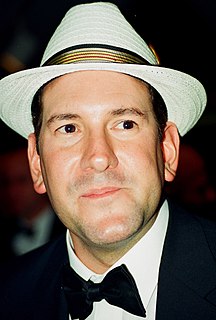Top 117 Offshore Quotes & Sayings - Page 2
Explore popular Offshore quotes.
Last updated on April 16, 2025.
Scientists have suggested that some whale deaths could be a result of marine noise, often a result of military activity, offshore drilling or exploration, which can disorient the animals and send them in the wrong direction, possibly toward beaches where they get stuck instead of into the deeper ocean.
The Greens have not been providing you with the full information about where their money comes from or what it's about. I think the Greens in this upcoming state election should resign if they're being funded by an offshore political power. It's tantamount to treason and something needs to be done about it.
It was cold and windy, scarcely the day to take a walk on that long beach Everything was withdrawn as far as possible, indrawn: the tide far out, the ocean shrunken, seabirds in ones or twos. The rackety, icy, offshore wind numbed our faces on one side; disrupted the formation of a lone flight of Canada geese; and blew back the low, inaudible rollers in upright, steely mist.
The executive orders. Barack Obama is doing it again with this ban that he thinks is in perpetuity on offshore drilling in the Atlantic Ocean and north of Alaska. It's bad what Obama's trying to do, and I know exactly what he is doing with this. But the first thing is, the areas that Obama has, by executive order, declared off-limits are areas nobody wants to drill in anyway. There are no plans to drill off the coast, the East Coast of the country out in the Atlantic, and there are no plans to drill north of Alaska in the Arctic Circle.
I wanted to destroy everything beautiful I'd never have. Burn the Amazon rain forests. Pump chlorofluorocarbons straight up to gobble the ozone. Open the dump valves on supertankers and uncap offshore oil wells. I wanted to kill all the fish I couldn't afford to eat, and smother the French beaches I'd never see. I wanted the whole world to hit bottom.
Offshore oil and gas has proven to be a vital strategic resource for the United Kingdom. Not only has it contributed to Britain's energy security over decades, but it has supported hundreds of thousands of jobs across the country and contributed hundreds of billions of pounds in taxes to the economy.
We can learn from all around the world. Germany, particularly, has been successful with rooftop solar generation. Other countries like Norway and Sweden have done work on it. Some of them have done offshore wind projects. So we're looking at learning from the best from all across the world. My approach is to get the best out of each one.
Most of the people in the upper income brackets are not rich and do not have wealth sheltered offshore. They are typically working people who have finally reached their peak earning years after many years of far more modest incomes-and now see much of what they have worked for siphoned off by politicians, to the accompaniment of lofty rhetoric.
Mitt Romney's losing at this point in a big way. If something's going to come out, get it out in a hurry. I do not know why - given that Mr. Romney knew the day that [Sen. John] McCain lost in 2008 that he was going to run for president again - that he didn't get all of this out and tidy up some of his offshore accounts and all the rest.
We have been developing an ever closer relationship with China on climate change for many years which has led to collaboration on carbon trading, offshore wind development, on low-carbon buildings, on nuclear energy, and on carbon capture and storage - to name just some of the ways in which we're working together.
I think there's a big difference between the impact of trade agreements on corporate America and the impact on Mr. and Mrs. America. Corporate America has adjusted to them by investing lots of capital offshore... What we're doing is we're exporting jobs and importing products instead of exporting products and keeping jobs.
If you're a wealthy heir with a trust fund, and you sell stocks, make your 10% gains since Donald Trump, and then you buy other stocks, you can avoid paying taxes. And if your accountant registers your wealth offshore in a Panamanian fund, like Russian kleptocrats do - and as more and more Americans do - you don't have to pay any tax at all, because it's not American income, it's foreign income in an enclave without an income tax.
One of the sports I do - my wife thinks I'm nuts - is open-water spear fishing, what we call blue-water hunting. We get in a boat, and we go offshore, normally about 30 miles. So when you jump off the boat, there are no reefs, and the bottom is no longer fifty or a hundred feet: it's thousands of feet. It's sort of like being in outer space.
Up here in Alaska we're sitting on billions of barrels of oil. We're sitting on hundreds of trillions of cubic feet of natural gas onshore and offshore. And it seems to be only the Republicans who understand that companies should be competing for the right to tap those resources, and get that energy source flowing into these hungry markets so that we will be less reliant on foreign sources of energy. In a volatile world, relying on foreign regimes that are not friendly to Americans, asking them to ramp up resource production for our benefit, that's nonsensical.
Jobs offshoring began with manufacturing, but the rise of the high-speed Internet made it possible to move offshore tradable professional skills, such as software engineering, information technology, various forms of engineering, architecture, accounting, and even the medical reading of MRIs and CT-Scans.
The drilling idea is spherically senseless - it's senseless from whatever point of view you look at it. It'd take 10 years to bring any oil online, and it would probably go to Japan. It sure wouldn't help gasoline prices here. All the economists say gasoline is still too cheap in the United States anyway. So here we're having this huge debate over offshore drilling that is just straightforward nonsense, which won't surprise you.
The isolation spins its mysterious cocoon, focusing the mind on one place, one time, one rhythm - the turning of the light. The island knows no other human voices, no other footprints. On the Offshore Lights you can live any story you want to tell yourself, and no one will say you're wrong: not the seagulls, not the prisms, not the wind.
I grew up in Florida, started fishing with my dad going down to the Everglades and around the state, plus some offshore stuff for sails and wahoo - but I never really got the bug until my husband and I went float fishing on the Snake River at Jackson Hole for trout - I've been pretty much addicted ever since.
There's just a law to the universe. We can have the San Andreas rip tonight. You've nothing to do with that. We could have had that super hurricane, that, look what it did to South Carolina two or three hundred miles offshore! Imagine if a category 5 eye wall went right up the Chesapeake Bay. They can say "well, mankind did that." No, mother nature decides. So, will we survive? I'm sure we will.
It's simply cheaper to operate the business offshore than it is domestically because of the tax rate, 35%, which is higher than anywhere else in the industrialized world. And one of the things the Trump team says they're gonna do is lower that to 15%. And if they do, folks, you haven't seen anything yet. If they succeed in that - and you watch.
Gas prices in many parts of the country are nearing $4 a gallon; it could get even worse as unrest spreads throughout the oil-exporting Middle East. Yet the Obama administration once again seems to see no crisis. It has curtailed new leases for offshore oil exploration for seven years and exempted thousands of acres in the West from new drilling. It will not reconsider opening up small areas of Alaska with known large oil reserves.
The fossil fuel industry commands outsize sway over U.S. politics, markets, and democracy. I knew these companies were formidable, but when I served on the National Commission on the BP Deepwater Horizon Oil Spill and Offshore Drilling, I got a close up view of how the industry disregards government safeguards.
The American Dream is alive and well for some, but not all Americans. Here in South Carolina, rural hospitals are closing, schools are underfunded, and our coasts are threatened by offshore drilling. We need a Senator who's fighting to improve the lives of South Carolinians rather than focusing on interests in Washington D.C.

















































